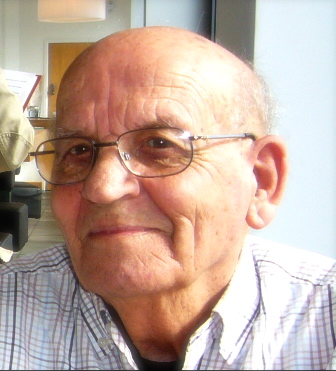It was October 1941; I had left school with a reasonable Schools Certificate and a school friend suggested I try to get an interview with the Engineer in Charge of the "H" Group Transmitter at our hometown, Hastings. The school friend was Denis Curd who was already working there. He went on to a wonderful engineering career that embraced OSE3 (Overseas Extension 3, i.e. Rampisham), 200 Oxford Street and, finally, Bush House.
My interview with the E.i.C. was quite friendly. I was introduced to the transmitter - a Series Modulated Tx 100 watts, the Crystal Drive, the Re-Broadcast Receiver the phone to London Control Room and the log book. Then I met the Boss. He was "Dixie" Dean, a pre-war senior engineer at the Washford, North Somerset Transmitter. He was in shirtsleeves and sat on the edge of his desk, swinging his legs, made a few jokes and then asked me if I knew Ohms Law. Actually I did, and on that he sent off an application form with his recommendation. It was as easy as that!
In a fortnight I received an official letter from Mr. P. A. Florence, the chief Engineer, which I still have and treasure:
'Dear Hayward. I have pleasure in offering you the post of Youth (Transmitters) (Under Training) at the weekly wage of £1/7/6d plus 3/- Cost of living Bonus....'Three months later I was sent to Bristol for a short training course under a Mr. Smith followed by a further 'hands on' course at Maida Vale and then onto Shift D in the sub-basement of London Control Room. My Senior Control Room Engineer (SCRE) was Bobby Howes who had a great sense of responsibility and wicked sense of humour. The Senior Maintenance Engineer (SME) who was in charge of the smooth running of the operation on his shift was Charles Challis. I was not quite 17, yet Charlie had implicit faith in youngsters like me, and the women staff who had been brought in on war service, to run the show with old pre-war hands like John Mills, Mr Coote, "Cally" Callaghan, Mr Boyle and others.
Of course, we made the odd mistake. I accidentally put a burst of 1100cps tone on to the Home Service programme. Every phone tag on the board dropped; every internal and outside phone in the place rang and there were screams from the operator in Home continuity. Charlie and Bobby went ballistic and I was sent on a sobering journey in the lift to the eighth floor to explain myself to the E.i.C. London, Mr Bottle - a fierce gentleman who, I was told, still came into work every day in a dark suit and Bowler hat. We tried not to make many errors!
After three years of LCR, I went into the Fleet Air Arm. I returned and was re-instated as a Junior Maintenance Engineer (JME) in the Control Room at Aldenham House, home of the Arabic and Latin American Service. There I changed my category to become a Junior Programme Engineer (JPE) and transferred to Drama Unit at BH Portland Place where duties included spot effects for editions of "Mrs Dale's Diary".
From there I went to Plymouth as a Studio Manager, then to Bristol as the External Services Producer (West). Then came a brief spell in television under Grace Wyndham-Goldie, directing a few of the last editions of "The Brains Trust" with Bernard Braden and a few of those terrible Barry Bucknell D.I.Y programmes!
It was then back to Bristol as Talks Producer running Radio 4's Archaeology "Origins", "Any Questions?", "Any Answers", etc. I was seconded to UNESCO as instructor to Arabic production staff and trained programme staff at Tanzania and Malawi. I finished as radio producer and Deputy Editor, Bristol, retiring after 42 years service in 1982.
Here's another article by Roy, originally written for the Arthur Bliss Society.
Mr Arthur Bliss (as he was then) held the position of "Head of Music" for the BBC at Broadcasting House, London during the last war. It was a strange title but I like to think these days that it was, perhaps, a very prophetic (?) one!
At the same period there was another senior member of the BBC Staff who was apparently responsible for all the numerous talks and discussion programmes that were broadcast on those memorable radio networks - the Home Service, the Light programme and the Third. His title was "Director of the Spoken Word". This title was eventually dropped after some bright person on the staff had the courage to point out that such an all-embracing position could only be held by God - which made it rather difficult for the gentleman in question.
I am sure it must have amused the Head of Music! That title remained and it was appropriate that Mr Bliss held the position for, if anyone was a head of music in those difficult days, he certainly was. His March Things to Come was immensely popular and familiar to the nation and some of his other works were not unknown at the annual Sir Henry Wood Promenade Concerts at the Albert Hall.
He was, at that time, one of a distinguished group of brilliant minds with offices on the third floor of Broadcasting House, whose courage and imagination determined the authority and character of the BBC in wartime and I was just a seventeen year old school-leaver - a trainee engineer working in the control room in the sub-basement of the building.
With all the heavy bombing of London and particularly the incendiary bombs that also did so much damage to property, all BBC staff, like so many other people in offices and businesses throughout the country, were required to do an occasional night's fire-watching on the roofs of the many premises the BBC occupied in the vicinity of Portland Place.
Quite by chance one night I found myself on top of the roof of a building just behind Harley Street during an air raid with Mr Bliss himself. I refer to him as "Mr" Bliss because that is how he introduced himself to me on that cold, windy, blacked out night and it is how I remember him now. Previous firewatchers had set up two or three decrepit kitchen chairs between the chimney pots and we sat and watched as the East End of London was getting yet another hammering. Quite what either of us would have done had a few incendiaries fallen on our roof or in the street below I am, to this day, somewhat uncertain.
It was not exactly a relaxed social occasion and as a teenager I was a bit un-nerved at being in the close presence of a senior member of staff that I would never have met in normal circumstances; but you cannot spend a night on the roof of a strange building in the blackout without talking to one another so we chatted about nothing in particular and Mr Bliss probably found it just as difficult as I did.
However, I do recall quite clearly how very kind and understanding he was. At that time, my brother was flying Lancaster Bombers with the RAF and very much involved in a series of desperately dangerous Pathfinder Operations. A week or so prior to this rooftop meeting, my brother had been shot down over France and reported missing. It was much on my mind and as we talked about it, Mr Bliss was uncannily so aware of what that meant to my family and me.
Of course, I do not remember his words after all this time but I do remember his kindly attitude and the atmosphere and have added it to my treasured memories. Reading his life story in later years, I only then, after so much time had passed, realised how he, too, had suffered and experienced the wasteful futility and cruelty of war.
However, neither incendiaries nor bombs fell near Harley Street or Portland Place that night and when the All Clear sounded we left the roof and departed. We did not meet again. I wish we had. But, again quite by chance, I did meet Lady Bliss many years later but that is another treasured memory!
Related pages
The following was written by one of Roy's sons, Glynn.

After D Day in 1944, Roy was attached to "War Report" (under Malcolm Frost) and operated the shortwave transmitter at BH that was in touch with our radio correspondents who were following the troops as they penetrated France. His War Service was with the Fleet Air Arm and he returned to the BBC after V.E. Day to Aldenham House in Hertfordshire - home to the Arabic and the Latin American Services. Here he changed from "maintenance engineer" to become a studio manager and was transferred to London Drama Unit, serving its major drama plays and, inevitably, "Mrs Dale's Diary"!
On promotion to Senior S.M. he was sent to the West Region's busy studio centre at Plymouth where he assisted in radio productions and also reported for Radio News Reel in Devon and Cornwall. He was later attached to TV Talks Dept at Lime Grove under Grace Wyndham-Goldie and directed a few of the last programmes in the series "The Brains Trust" when Bernard Braden was chairing the programme. He also directed some of Barry Bucknell's DIY programmes.
Roy liked the complex and exciting nature of TV production but he was very committed to radio and he returned to Bristol to take up the post of External Services Representative for the West Region and spent several years getting programmes from the West Country into our Overseas services.
In 1960 he was seconded to U.N.E.S.C.O. to assist in a training project at Radio Omdurman, Sudan, where several radio staff of the Arabic Member States in the Middle East were taught modern techniques in Radio Documentary production. The following year he was invited by Tanzania to train all their new staff in radio programme making - and, again, the next year, he was doing the same for all the new staff in Malawi after the country's Independence.
Back in Bristol, Roy was closely involved with the early tests and experiments of Local Radio and was in charge of a special investigatory experiment for a local station on the Isle of Wight. In Bristol he produced many radio programmes over the years - documentaries, talks, "Any Questions?" and "Any Answers" ; even Regional editions of "Woman's Hour" but perhaps his speciality was to continue the West of England's long tradition of covering archaeology as a subject of public interest that had been started in the Bristol output in the early 1950s. Later, the annual series, "Origins", presented by Malcolm Billings, visited many parts of the world where there were significant archaeological discoveries to bring to the listener's attention. Amongst them were included the discovery, after searching for more than 25 years, of the unrobbed tomb of Philip, father of Alexander the Great in Salonika, Greece and from central China, the first radio coverage in the world of the discovery of the Terracotta Warriors at Xian, China.
Roy retired in 1982 as Deputy Editor, Radio after 41 years service.
In Plymouth he had met and later married Glen and they celebrated 53 years of marriage. His passion for photography earned him an Associateship of the Royal Photographic Society and he published a book on photographic techniques. He also contributed many articles to Newspapers and magazines mostly on archaeological subjects including a scientific contribution to a Time Life publication on the change from Hunter/Gatherers to the early settlers. In recent years he took up Archery and Air Gun Target shooting.
Roy will be greatly missed by his loving family. - Glynn Hayward.

